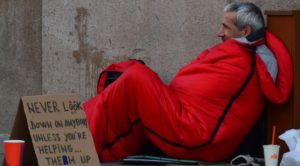
Florida Panhandling Laws
The state of Florida’s panhandling statutes generally focus on roadways. Accordingly, it is against state law for someone to obstruct or impede traffic on Florida’s streets, roads, or highways for the purpose or intention of soliciting money. State law makes a violation a second-degree misdemeanor which may include a monetary fine of up to $500 or up to 60 days in jail.
To consult with an experienced litigation lawyer today
855-780-9986
Daytona Panhandling Laws
In early February of this year, Daytona Beach city commissioners unanimously passed new panhandling regulations. The effect was immediate, according to the Daytona Beach News Journal, as the next day the amount of solicitors decreased significantly. Daytona Beach police officers had been warning panhandlers the week before commissioners passed the new law.
Specifically, the new regulations authorize law enforcement officers to charge fines of $200 and even arrest individuals who are found panhandling in newly outlawed areas within the city, trying to solicit money from people aggressively, or begging after the sun has gone down.
Daytona Beach’s Panhandling Ban Extends Within 20 Feet of:
- An exit or entrance of commercially zoned property
- A bus stop or public transportation facility
- An automated teller machine
- Parking garages and lots
- Parking meters and pay stations; and
- Any public bathroom operated by a government agency.
Aside from Banning Geographical Locations, the New Law also Prohibits Panhandling Behavior Including:
- Aggressively approaching vehicles
- Soliciting others at outdoor merchandise and dining areas
- Touching a panhandling target without his or her consent
- Using abusive or profane language when refused money; and
- Trying to get money out of individuals when they are in line waiting to enter a business.
In addition to not allowing begging for money after dark in Daytona Beach, the ordinance also makes it against the law to panhandle while under the influence of illicit drugs or alcohol. Panhandling bans are also instituted on the Boardwalk, within 100 feet of any daycare center or school, and within 150 feet of any signalized intersection.
In addition to not allowing begging for money after dark in Daytona Beach, the ordinance also makes it against the law to panhandle while under the influence of illicit drugs or alcohol.
Know the Law
If you are a business owner, resident, or tourist in Daytona Beach who has been aggressively approached by panhandlers, know that you are protected under local law. If you have questions about Daytona Beach’s recent anti-panhandling laws, contact the Daytona attorneys at Bogin, Munns & Munns.
NOTICE: The article above is not intended to serve as legal advice, and you should not rely on it as such. It is offered only as general information. You should consult with a duly licensed attorney regarding your Florida legal matter, as every situation is unique. Please know that merely reading this article, subscribing to this blog, or otherwise contacting Bogin, Munns & Munns does not establish an attorney-client relationship with our firm. Should you seek legal representation from Bogin, Munns & Munns, any such representation must first be agreed to by the firm and confirmed in a written agreement.
Call or Submit Our Consultation Request Form Today





